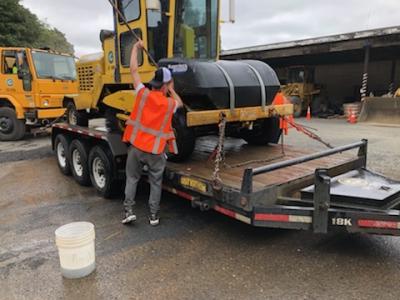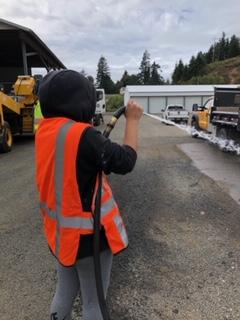
In the local public safety community, the Clatsop County Juvenile Department plays a special role.
The office is tasked with holding juvenile offenders accountable for their behaviors while also creating structured supervision designed to steer them away from further illegal activity and penetration into the adult criminal justice system, according to Kelly Braaten, Juvenile Department Director since August 2019.
Offenders from age 12 up to 18 come under the department’s jurisdiction, but depending on the length of probation, a youth may be under supervision until age 25. The department’s three juvenile counselors each handle 20 or 21 cases, a slight increase in recent years.
Juvenile counselors’ roles are similar to those of parole and probation officers in the adult legal system, but with some notable differences. Unlike with the adult system, juvenile counselors may become involved with the youth from the first contact with law enforcement, even in the middle of the night – the department is on call 24 hours a day.
The process for each youth begins with an intake interview between a juvenile counselor and the juvenile and his or her parents or guardians where they are informed about the juvenile justice system and expectations. The department then determines, based on various factors including the severity of the crime and the youth’s willingness to cooperate, whether the case will be referred to juvenile court or handled through a Formal Accountability Agreement, a form of diversion that keeps the case out of court but still provides structured supervision.
For cases that do involve detention, the department relies on contracts with other jurisdictions to detain youth offenders who pose a community safety risk or pending a court hearing and detention is determined to be the least restrictive placement option. Recently the department switched from Cowlitz County, Washington to Yamhill County for detention bed rentals. Braaten said Yamhill offers more flexibility, better video court services, and on-site schooling – an important service since education has a direct impact on recidivism.
Families remain an integral part of the juvenile supervision process from start to finish, and counselors also work with the youths’ schools. They also oversee the juveniles’ progress in the various treatment programs aimed at particular mental health needs or criminal behaviors which include drugs and alcohol use, property crimes, violent crime, and sexual offenses.
“We’re not just policing the kid – we’re trying to formulate a plan to help the kid get through the probationary period,” Braaten said. “There’s a lot of coordination the counselor takes on.”
That coordination goes on with every one of the department’s active cases; Braaten likened it to working on multiple jigsaw puzzles at once. “You need to be able to pivot and problem-solve,” he said.
As it has with much of the rest of the legal system, the COVID-19 pandemic has forced changes to the Juvenile Department’s routine. Court appearances are mostly all virtual, and counselors can no longer make the regular home visits that are part of supervision – although they try to at least visit with the youth and their families in the front yard to maintain that connection, Braaten said.
The department sometimes makes its lobby available for kids without reliable Internet connections at home in order to go online for school.
Tori Anderson joined the department in 2003 and is lead counselor. The key factors for those youth who successfully complete supervision and stay out of trouble, she said, are positive support from adults, families, schools, and the community.
“It’s nice to run into someone you’ve worked within the local community, and see how well they’re doing,” she said.








